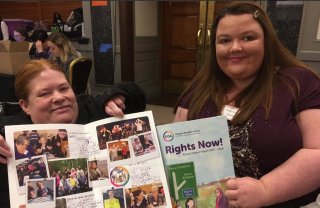Resources

DPO Movement in Scotland Letter to First Minister warns that “disabled people are dying of poverty”
PublicationDisabled People’s Organisations in Scotland wrote to the First Minister on the 4th September 2023, to urge him to use the new parliamentary session to reset his relationship with disabled people and our organisations.
More importantly, we asked the First Minister in Scotland to prioritise disabled people in Scotland by asserting his leadership to drive forward an Immediate Priorities Plan to tackle the poverty and inequalities which are blighting lives, eroding rights and leading to poorer life outcomes for disabled people, including dying in higher numbers.
The letter was written by GDA and supported by Inclusion Scotland, Glasgow Centre for Inclusive Living, Lothian Centre for Inclusive Living, Self-Directed Support Scotland, People First Scotland and Disability Equality Scotland.
The First Minister must use the new programme for government as an opportunity to show his commitment to prioritising disabled people in his policies and tackling the rife poverty and inequalities we are facing.
Download Now
New Podcast Episode – Disabled People in Glasgow Call for Radical Reform in a National Care Service to End Social Care Crisis
PodcastToday, Glasgow Disability Alliance launches the second in a three episode series ‘Care About Us’: A podcast made by disabled people about the social care system and how it needs to change.
In Episode Two, ‘A System in Crisis’, we speak to GDA members & activists about the social care staffing crisis, cuts to care and the reality of social care in Glasgow.
Listen Now
Disabled People’s Podcast calls for Radical Reform in Social Care in Glasgow
PodcastToday on the 75th anniversary of the NHS and in the context of a new deal between Scottish Government and Local Government, Glasgow Disability Alliance launches the first in a 3 episode series ‘Care About Us’: A podcast made by disabled people about the social care system and how it needs to change.
Now more than ever, we need the Scottish Government and Local Authorities to start prioritising disabled people, embed equalities in their approach and listen to us as a community of identity.
GDA Member, Paula: “It’s a nightmare really. I wish I didn’t have to have carers, but I don’t have a choice. It’s degrading. Completely degrading”.
GDA Member, Luke: “The media, the public, they all think of us as a burden.”
In the new podcast series, GDA members and activists in Glasgow tell us what social care means to them, what the main issues are in social care and how it needs to change.
With £21 million cut to social care support in Glasgow in March, a delayed National Care Service Bill and a new agreement between Local Authorities and Scottish Government threatening ring-fenced, protected funding for social care, disabled people cannot be ignored anymore.In the current social care system, disabled people are facing: rising care charges, slashed care packages, inhumane and often cruel treatment and a system that is unable to uphold basic human rights.
The social care system in its current form is too broken and fragile to meet the real needs of disabled people in Scotland.Listen Now
Summer Programme 2023 for Young Disabled People
PublicationGDA's Summer Programme for young disabled people 14+ is now live!
Our Summer programme brings together our young members to build skills, have fun and make friends!
All GDA workshops are free and fully accessible. Transport, lunches and PA support provided.
GDA welcomes young people with any type of impairment/disability. Don’t be bored this summer, come and join us to meet others and have some fun!
Download Now
Adult Disability Payment (Mobility Component) GDA Consultation Response
PublicationThis response was informed by the lived experience of GDA members, disabled people who have a range of impairments and conditions including those with physical impairments, mobility impairments, people who are neuro-diverse, those who have learning difficulties, disabled people who are blind and deaf or who have visual or hearing impairments, people who experience mental health conditions and distress and people who have experienced head injuries among others. The age ranges were from 17+ - 65.
65 disabled people attended a specific online event, held in April 2023, including members representing the views and experiences of younger disabled people, Black, Asian and minority ethnic disabled people and LGBT disabled people.
This response also draws on GDA’s significant dialogue and intensive engagement and supports with and for disabled people over two decades, most notably over the duration of building Social Security Scotland which GDA has been closely involved with. The Report therefore draws on the lived experience shared by thousands of disabled people and reported to us.
Download Now
GDA Voices Newsletter 2022
PublicationIt's been a busy year for GDA Members!
Thank you for your hard work and dedication to campaigning, contributing and working with us to make sure disabled people's voices are heard in Glasgow and beyond.
GDA Voices Programs Include:
Drivers for Change
Social Care Expert Group
Young Drivers for Change
BAME Network
LGBT Network
Women's NetworkThis newsletter gives a short overview of our activities in 2022.
Download Now





